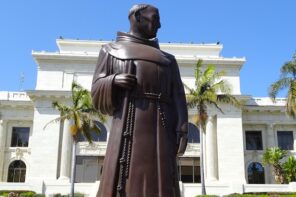Nearly three years after Dr. George Tiller was gunned down while serving as an usher at a Lutheran church in Wichita, Kansas, the role of religion in the lives of doctors who provide abortion care, and the religious activists who support their work, remains underreported.
Physicians for Reproductive Health and Choice and the Religious Coalition for Reproductive Choice recently commemorated the National Day of Appreciation for Abortion Providers, held on the anniversary of the 1993 assassination of Dr. David Gunn by an anti-choice extremist outside his medical office in Pensacola, Florida.
“Dr. Tiller’s murder really affected me,” Sister Donna Quinn, a nun, feminist activist, and former clinic escort (or as she describes it, “peacekeeper”) at a clinic on the south side of Chicago, told me this week. “To think that he was murdered inside a church really brought it home to me.” Doctors and other staff at clinics are heroes, she emphasized, “making sure women are at peace with this decision, making sure they know what they are doing, and that everything is safe for them.”
A doctor I spoke with this week, who is Catholic and provides abortions, described to me how she chose OB/GYN as her specialty, and deliberately decided to perform abortions because of the lack of providers.
This doctor, who practices in the South, described her evolution from an anti- to pro-choice. Raised a practicing Catholic, the doctor said that as a young adult, “ironically,” she didn’t believe the Catholic Church was conservative enough. She joined evangelical groups like Campus Crusade for Christ while in college.
Although she was taught abortion was wrong, abortion and contraception were rarely discussed at the Catholic Church the doctor attended as a child. It was from evangelical organizations and friends that she received anti-choice literature—but she eventually found these views to be “judgmental,” she said. By the end of college, she was pro-choice. “I felt it could be squared with my religion,” she told me. “I talked to other Catholics or Christians who are pro-choice.” Reading literature from organizations like Catholics for Choice, she said, she came to understand “how the holy spirit comes through your conscience.”
She also learned, the doctor added, that the Catholic Church “has changed its position on abortion multiple times.” She came to the conclusion that its current stance is “arbitrary, this is kind of a man-made construct of the Catholic Church.” She added, “I didn’t find anything in the Bible to make me think it was black and white.”
Quinn, a coordinator for the National Coalition of American Nuns, the Women-Church Convergence, and the Religious Coalition for Reproductive Choice—Illinois, is a well-known advocate for equality for women within the Catholic Church. “I want to call the church as I have been for years to leave its totalitarian way of governing its people,” she told me. The church should “respect the right to dissent. Do not excommunicate, silence or expel those who work for justice, particularly reproductive justice.”
Quinn has advocated for women voting for leadership, for the ordination of women, inclusive scripture and canon law, and for a “feminist sacramental system.” All of this, she says, “would be preparing for respect for women’s moral agency and primacy of conscience.”
Catholic parishes encourage people, said Quinn, to protest outside abortion clinics. Catholic parishioners protesting at the clinic where she was an escort reported her to the local Cardinal. As a result, she was rebuked by her order in 2009, and decided not to continue her work as an escort. Her activism, however, continues unabated, including recently organizing an event, “Contraception Is Not Controversial” in Chicago with Democratic Representatives Mike Quigley and Jan Schakowsky.
The doctor said she is worried about the increasing number of restrictions on abortion states are implementing. (To get a sense how women’s access to abortion is shrinking across the country, take a look at this map assembled by the Guttmacher Institute.) Twenty-four hour waiting periods, for example, can cause a woman to miss the one day a week a clinic performs abortions, pushing the procedure off another week and making it riskier and more expensive to perform.
Quinn, too, worries about how women “are disparaged as they go into clinics. They’re prayed at that God is not supporting this. This is nonsense.” The growing number of crisis pregnancy centers are “applying the principle that women should not enjoy sex, that women are on a pedestal like the blessed mother.”
For the doctor, her faith is “an important part of my life I think it still helps me find balance and determine what actions to take. I do feel like I have a calling for certain things, including the work I do, and that comes from my faith and my beliefs.”
“I’ve been working on it for a long time,” said Quinn of her activism. “I began to see that they [the Bishops] try to control with books they write and decrees they make, policies. They try to control your mind, but to control your bodies is something I am going to stand up and fight.”




